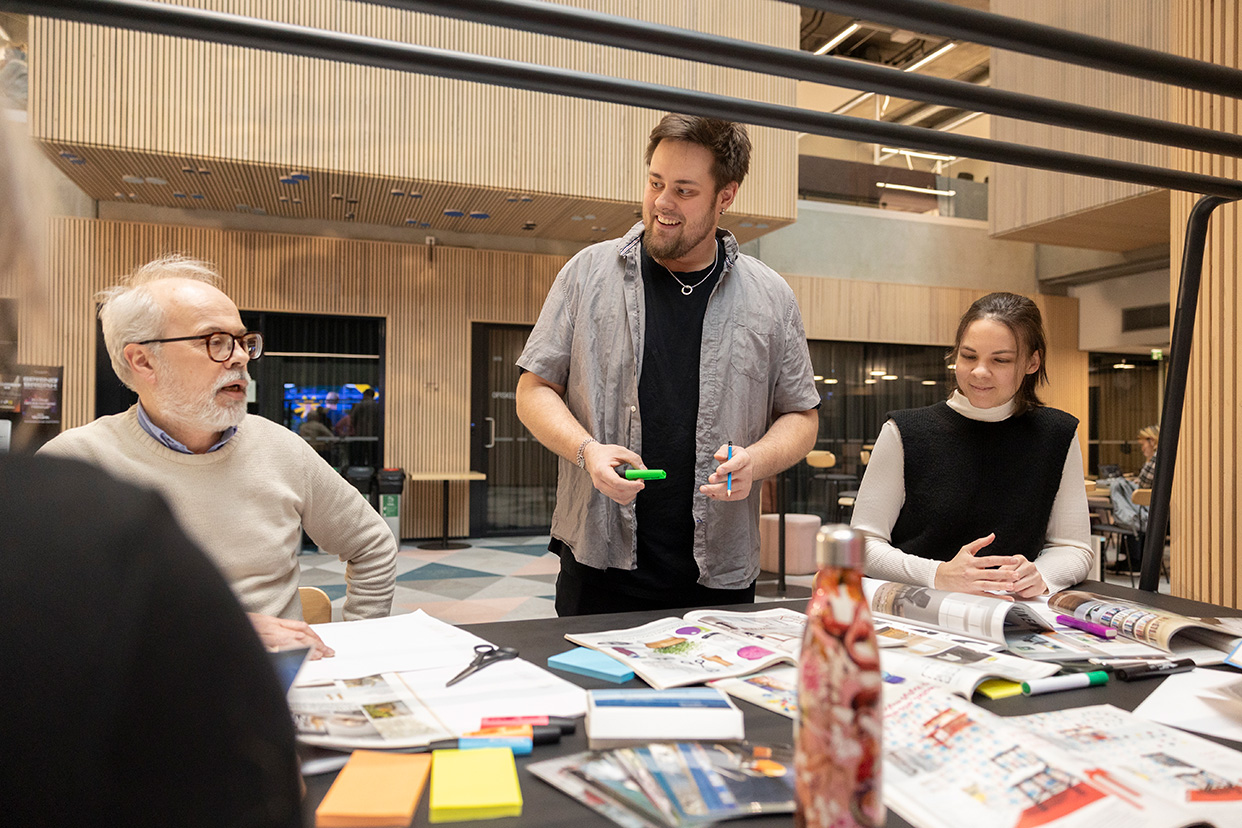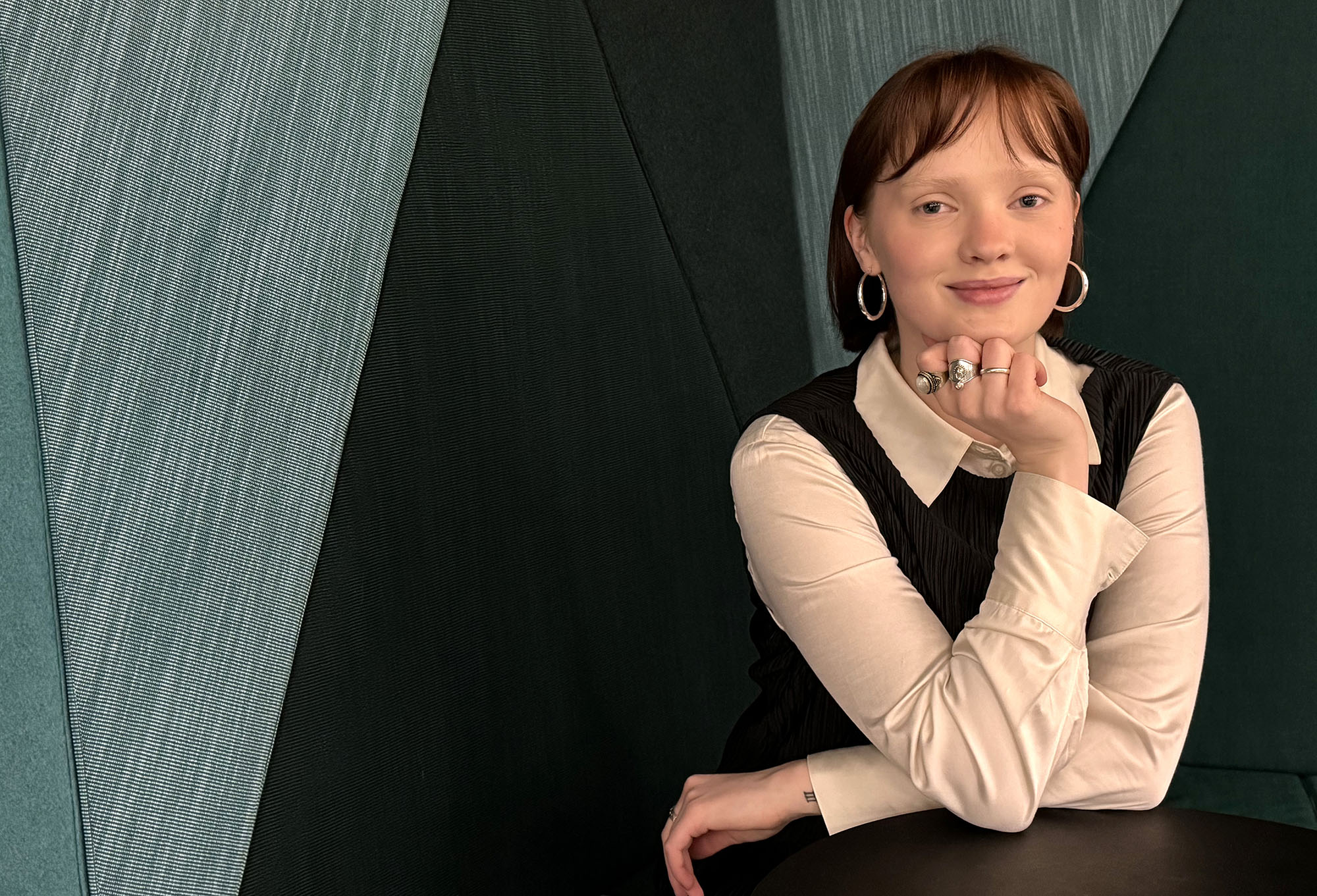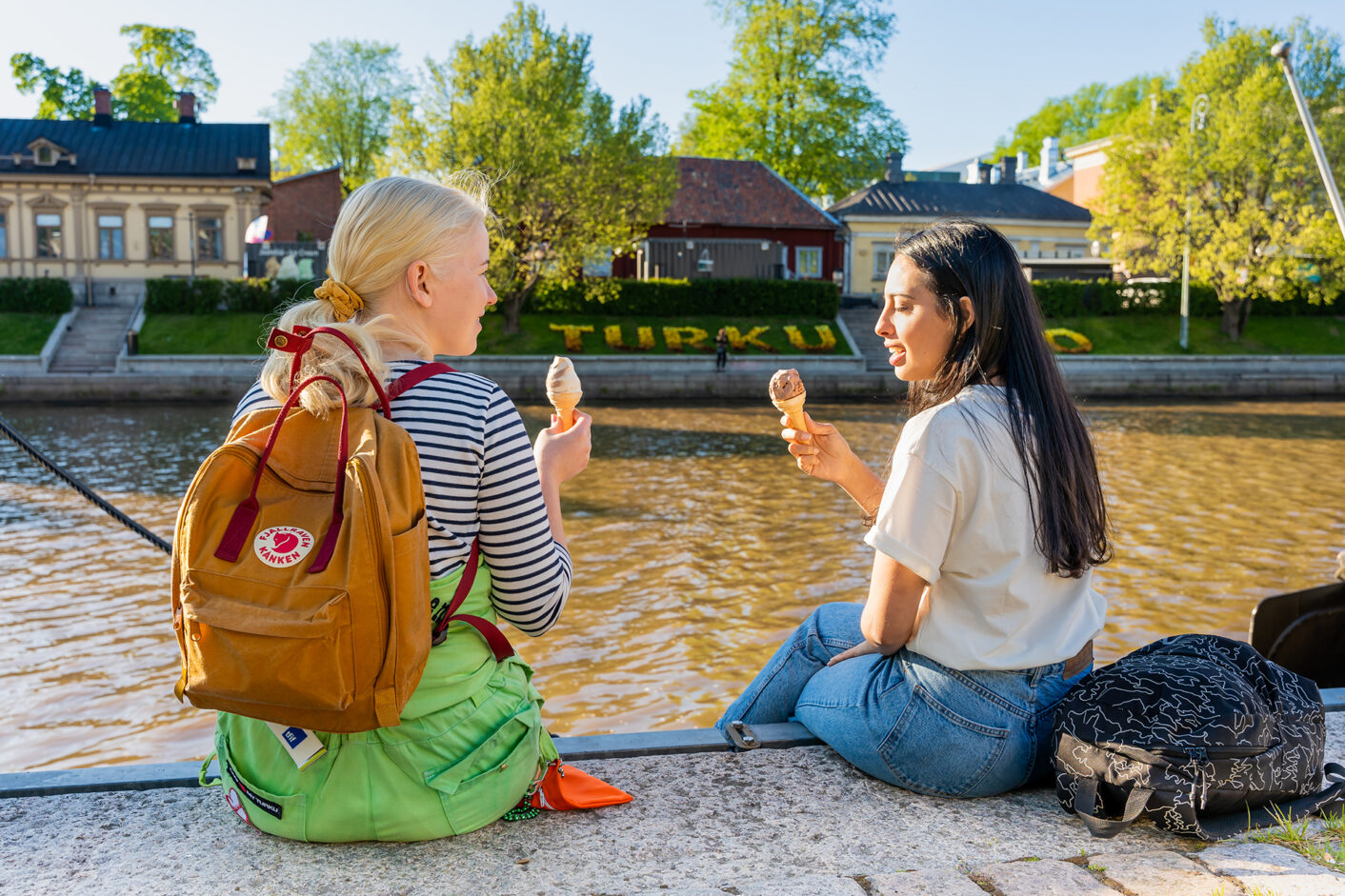Sosionomi AMK
Sosionomi on sosiaalisen hyvinvointityön asiantuntija. Sosionomin työ on vaativaa ja monipuolista. Turun AMK:sta valmistuneet sosionomit työskentelevät usein aikuissosiaalityön, sosiaalisen kuntoutuksen, sosiaaliohjauksen ja varhaiskasvatuksen tehtävissä.
Sosionomiksi voit opiskella päiväkoulutuksessa Turun kampuksella tai verkkototeutuksessa. Lisäksi tarjolla on englanninkielinen koulutus, joka toteutuu päiväopiskeluna Salon kampuksella.

Tutkintonimike
Sosionomi (AMK)
Laajuus ja kesto
Toteutustavat
Seuraava haku
Paikka
Kupittaan kampus tai verkossa
Opetuskieli
Mitä sosionomi tekee?
Sosionomi on sosiaalisen hyvinvointityön – ihmisten auttamisen ja tukemisen sekä ihmisen kasvun ja kehityksen edistämisen – asiantuntija. Sosionomi vahvistaa ihmisten arjessa selviytymistä ja ohjaa heitä tarvitsemiensa palvelujen piiriin. Sosionomi edistää ihmisten välistä yhdenvertaisuutta ja sosiaalisen turvallisuuden toteutumista inhimillisellä ja sosiaalisesti oikeudenmukaisella tavalla.
Sosionomit tuottavat ja kehittävät palveluita, ja työskentelevät erilaisten asiakasryhmien kanssa. Opinnoissasi voit syventää osaamistasi esimerkiksi lasten, nuorten, aikuisten tai ikääntyneiden parissa työskentelyyn.
Jos tavoitteenasi on työt varhaiskasvatuksessa, voit sisällyttää tutkintoosi varhaiskasvatuksen sosionomin kelpoisuuden edellyttämät varhaiskasvatuksen ja sosiaalipedagogiikan opinnot (60 op).
Mitä opinnot sisältävät?
Sosionomikoulutus sisältää ydin- ja laajentavan osaamisen opintoja, harjoittelua ja opinnäytetyön.
Opintojen perustana ovat sosiaalialan ammattikorkeakoulutukselle yhteisesti sovitut, valtakunnalliset osaamisalueet, joita ovat
- sosiaalialan eettinen osaaminen,
- asiakastyön osaaminen,
- sosiaalialan palvelujärjestelmäosaaminen,
- kriittinen ja osallisuutta edistävä yhteiskuntaosaaminen,
- tutkimuksellinen kehittämis- ja innovaatio-osaaminen sekä
- työyhteisö-, johtamis- ja yrittäjyysosaaminen.
Laajentavan osaamisen opinnoissa valitset sinua kiinnostavat ja osaamistasi tukevat menetelmä- ja asiakasryhmäkohtaiset opinnot. Verkko-opinnoissa on tarjolla vain osa valinnaisista opinnoista.
Valinnaisia asiakastyön menetelmäopintoja valitset yhteensä 15 op. Tarjolla on esimerkiksi opintojaksot ryhmänohjauksen menetelmistä, digi- ja mediaosaamisesta tai palvelumuotoilusta. Kaikkia menetelmäopintoja ei ole tarjolla verkko-opintoina.
Valinnaisia asiakasryhmäkohtaisia opintoja valitset yhteensä 30 op (20 + 10 op yhdistelmä). Asiakasryhmäkohtaisia opintoja ovat:
- sosionomi aikuistyössä
- sosionomi vammaistyössä ja ikääntyneiden palveluissa
- sosionomi lastensuojelussa
- sosionomi kouluikäisten ja nuorten kanssa tehtävässä työssä
- sosionomi varhaiskasvatuksessa.
Asiakasryhmäkohtaisista opinnoista verkko-opintoina on valittavissa vain aikuistyön (20 op), vammaistyön ja ikääntyneiden palveluiden (20 op) sekä lastensuojelutyön (10 op) yhdistelmät.
Varhaiskasvatuksen sosionomin pätevyyttä tavoittelevat valitsevat varhaiskasvatuksen asiakasryhmäkohtaiset opinnot (30 op).
Tutustu tarkemmin opintojen sisältöön opinto-oppaassa:
Millaista opiskelu on?
Sosionomiksi voit opiskella päivä- tai verkkototeutuksessa. Toteutusmuotojen opiskelutavat ja sisällöt eroavat toisistaan.
Päivätoteutus, Turku
Päivätoteutuksessa lähiopetusta on arkisin, pääsääntöisesti päiväaikaan Turussa Kupittaan kampuksella.
Opiskelu sisältää lähiopiskelua Turun kampuksella sekä verkossa, itsenäistä opiskelua, pienryhmätyöskentelyä sekä opiskelua ja harjoittelua työelämälähtöisissä projekteissa, palvelutoiminnassa ja työpaikoilla.
Päivätoteutuksessa on tarjolla kaikki vaihtoehdot menetelmä- ja asiakasryhmäkohtaisista valinnaisista opinnoista. Osa päivätoteutuksen opinnoista toteutuu verkossa.
Turun kampuksen päivätoteutus sopii hyvin sinulle, jos
- haluat varhaiskasvatuksen sosionomin pätevyyden
- haluat mahdollisimman paljon lähiopintoja
- sinulla ei ole aiempaa koulutusta tai kokemusta sote-alalta
- haaveilet perinteisestä opiskelijaelämästä
Verkko-opinnot
Sosionomikoulutuksen verkkototeutuksessa opiskelet kaikki opinnot verkossa. Tutkintoon kuuluvat harjoittelut suoritetaan harjoittelupaikalla.
Verkko-opintoihin kuuluu aikataulutettua lähiopetusta verkossa. Lisäksi opinnot sisältävät itsenäistä opiskelua, pienryhmä- ja tiimityöskentelyä sekä opiskelua ja harjoittelua työelämälähtöisissä projekteissa, palvelutoiminnassa ja työpaikoilla.
Opinnot alkavat kahden päivän mittaisilla orientaatiopäivillä, jotka järjestetään verkossa. Opintojen aloitusvaiheessa kerrotaan ensimmäisen lukukauden verkkotapaamisten aikataulu. Opintojen edetessä opiskelijan yksilölliset valinnat vaikuttavat verkkotapaamisten ajankohtiin ja määrään.
Verkko-opinnot ovat päätoimista opiskelua. Opintoja on mahdollista suorittaa työn ohessa, varautuen kuitenkin viikoittaisiin verkkotapaamisiin sekä täyspäiväisen opiskelun vaatimaan työmäärään. Opintoihin kuuluu myös harjoittelujaksoja (7 – 10 vko / jakso) oman työpaikan ulkopuolella.
Kaikkia sosionomikoulutuksen valinnaisia menetelmä- ja asiakasryhmäkohtaisia opintoja ei voi suorittaa verkossa.
Verkko-opinnot sopivat hyvin sinulle, jos
- haluat syventyvä aikuis-, vammais- tai vanhustyöhön opinnoissasi
- haluat opiskella työn ohessa
- haluat kehittää samalla digitaitojasi
- sinulla on aiempaa koulutusta tai kokemusta sote-alalta (aiempi kokemus ei ole edellytys opinnoille)
Tutkinto kokonaan englanniksi
Voit opiskella sosionomitutkinnon myös kokonaan englanninkielisessä Bachelor of Social Services, Early Childhood Education -koulutuksessa. Koulutus on toteutuu päiväopiskeluna Salon kampuksella.
Englanninkielisessä koulutuksessa suuntaudutaan varhaiskasvatukseen. Koulutukseen haetaan kevään ensimmäisessä yhteishaussa.
Mihin sosionomi työllistyy?
Sosionomi (AMK) -koulutus antaa hyvät valmiudet työelämään. Vastavalmistuneiden sosionomien työllistymistilanne on hyvä, suurin osa on työllistynyt heti valmistumisen jälkeen. Talentian Urapolut-selvityksen mukaan valmistuneista sosionomeista työttöminä on vain 2 % (Talentia 2023).
Sosionomit toimivat erilaisilla tehtävänimikkeillä
- työvoimapalveluiden,
- oppilas- ja opiskelijahuollon,
- varhaiskasvatuksen,
- kuntoutus- ja vammaistyön,
- nuorisotyön,
- vanhustyön,
- päihde- ja mielenterveystyön,
- maahanmuuttajatyön,
- lastensuojelutyön ja
- rikosseuraamusalan tehtävissä.
Sosionomin ammatissa voi toimia vain tutkinnon suorittanut, laillistettu ammattihenkilö. Tutkinnon suorittanut voi hakea Sosiaali- ja terveysalan lupa- ja valvontavirasto Valvirasta virallista oikeutta harjoittaa sosionomin ammattia.
Varhaiskasvatuksen sosionomin kelpoisuus edellyttää varhaiskasvatukseen ja sosiaalipedagogiikkaan suuntautuneita opintoja vähintään 60 op. Jos sisällytät tutkintoosi riittävän määrän vaadittuja opintoja, voit anoa erikseen varhaiskasvatuksen sosionomin pätevyyttä.
-
Opiskelija

Sosionomiopinnoista saa vahvan pohjan asiakastyöhön
Turun ammattikorkeakoulun sosionomikoulutus tarjoaa monipuolisia mahdollisuuksia sosiaalialalla työskenteleville. Kiinnostus ihmisten auttamiseen ja yhteiskunnallisiin asioihin innostivat sosionomiopiskelija Anna Haapakummun hakeutumaan opintoihin. Sosionomikoulutus tarjoaa kattavan yhdistelmän teoriaa ja käytäntöä, mikä valmistaa opiskelijoita työelämään.
Hae koulutukseen
Tästä koulutuksesta on tarjolla erilaisia toteutuksia. Huomaathan, että kaikki hakukohteet eivät ole jokaisessa haussa mukana.
Voit hakea tähän koulutukseen yhteishaussa tai avoimen AMK:n kautta polkuopintojen haussa.
Koulutus on mukana seuraavissa hauissa:
Hakuaika päättyy haun viimeisenä päivänä klo 15.00.
Hakulomakkeet Opintopolussa
Kevään ja kesän hauissa mukana
Syksyn hauissa mukana
Miten opiskelijat valitaan ja haku etenee?
Yhteishaku: katso hakuohjeet, valintaperusteet ja aikataulu.
- Tähän koulutukseen opiskelijat valitaan todistusvalinnan tai AMK-valintakokeen perusteella.
Polkuopintojen haku: katso hakuohjeet, valintaperusteet ja aikataulu.
- Polkuopinnoissa valintatapana on joko arvonta, motivaatiolomake tai valintakurssi. Tarkat tiedot löydät Opintopolusta.
Kuinka monta opiskelijaa koulutukseen valitaan?
Löydät yhteishaun ja polkuopintohaun haussa olevien opiskelupaikkojen määrän Opintopolusta koulutuksen tiedoista. Opiskelupaikkojen määrä vaihtelee vuosittain.
Tämän AMK-koulutuksen ensikertalaisuuskiintiö on 90 %, eli valtaosa aloituspaikoista varataan yhteishaussa hakijoille, joilla ei ole vielä korkeakoulututkintoa tai aiempaa paikan vastaanottoa korkeakoulututkintoon.
Polkuopintojen haussa ei ole ensikertalaisuuskiintiötä, eli tämä haku kannattaa huomioida erityisesti, jos olet jo aiemmin ottanut vastaan opiskelupaikan korkeakoulusta.
Kuinka paljon hakijoita on ollut aiemmin? Tutustu hakijatilastoihin.
Miten polkuopinnoissa opiskelu eroaa tutkinto-opinnoista?
Polkuopinnot ovat vaihtoehtoinen reitti tutkintoon. Polkuopintojen kautta voit aloittaa tutkintoon kuuluvien opintojen opiskelun avoimen AMK:n opinto-oikeudella. Polkuopinnot koostuvat AMK-tutkinnon ensimmäisen vuoden opinnoista (60 op), jotka suoritat samassa ryhmässä tutkinto-opiskelijoiden kanssa, osana opiskelijayhteisöä. Varsinainen opiskelu tai opintojen sisällöt eivät poikkea tutkinto-opinnoista.
Polkuopiskelijana et voi suorittaa AMK-tutkintoa, mutta menestyksellä suoritettujen polkuopintojen jälkeen voit hakea tutkinto-opiskelijaksi avoimen väylän erillishaussa. Tutkinto-opiskeluoikeuden saatuasi voit jatkaa opintoja saumattomasti valmistumiseen asti.
Toisin kuin tutkinto-opinnot, polkuopinnot ovat maksullisia. Myös polkuopiskelijan eduissa on eroa tutkinto-opiskelijoihin. Lue lisää polkuopinnoista.
Koulutukseen vaadittava terveys ja toimintakyky
Sosiaali- ja terveysalan koulutuksissa edellytetään, että opiskelija on terveydentilaltaan ja toimintakyvyltään kykenevä opintoihin liittyviin käytännön tehtäviin tai harjoitteluun. Lisäksi alan koulutuksissa on alaikäisten turvallisuutta sekä potilas- ja asiakasturvallisuutta koskevia vaatimuksia, jotka rajoittavat opiskelijaksi ottamista.
Perehdy opiskelijan terveydentilaan ja toimintakykyyn liittyviin vaatimuksiin jo hakuvaiheessa.
Voinko opiskella työn ohella?
Monimuotokoulutukset ja verkko-opinnot on suunniteltu siten, että töiden ja opiskelun yhdistäminen on paremmin mahdollista. Lähiopetusta kampuksella tai etätapaamisia verkossa on useimmiten 1 – 2 päivänä viikossa. Opintoihin kuuluu lisäksi harjoittelua, joka on pääsääntöisesti kokopäiväistä työtä. Lähiopetuksen, etätapaamisten ja harjoittelujaksojen aikataulutus, kesto ja toteutustavat vaihtelevat koulutuksittain.
Päiväkoulutuksissa opetusta on pääsääntöisesti arkisin (klo 8 – 18). Kokoaikainen työskentely opintojen ohessa on siis päiväkoulutuksissa usein mahdotonta. Monet opiskelijat tekevät kuitenkin opintojen ohessa keikka-, ilta- tai viikonlopputöitä.
On hyvä muistaa, että opiskelu vaatii aikaa ja työtä. Kaikki koulutukset sisältävät kontaktiopetuksen lisäksi mm. itsenäistä ja ryhmätyöskentelyä, jota ei ole aikataulutettu lukujärjestykseen. Työnteon mahdollisuuksia kannattaakin pohtia suhteessa omiin voimavaroihin. Erityisesti päiväkoulutuksissa voi olla suositeltavaa aloittaa opinnot ensin, ja tarkastella sitten, riittääkö oma aika ja jaksaminen työntekoon opintojen ohella. Jos saat Kelan opintotukea tai muuta etuutta opintojen aikana, voi etuuden saamiseen liittyä tulorajoja tai muita työntekoa rajoittavia ehtoja
Voinko hyväksilukea aiempia opintoja?
Tutkintoon voidaan hyväksilukea aiemmin suoritettuja opintoja tai osaamista, mikäli ne vastaavat koulutuksen oppimissuunnitelman tavoitteita ja sisältöjä. Hyväksilukemisesta käytetään termiä “aiemmin tai muualla hankitun osaamisen tunnistaminen” eli AHOT.
Hyväksiluvut käsitellään aina tapauskohtaisesti. Saat tarkempia ohjeita hyväksiluvuista koulutuksen alkaessa.
Koska opinnot alkavat?
Kevään yhteishaussa ja kesän polkuhaussa haussa olevat koulutukset alkavat elokuussa.
Syksyn yhteishaussa ja syksyn polkuhaussa haettavat koulutukset alkavat tammikuussa.
Avoimen väylän haku, siirtohaku ja muut haut koulutukseen
Voit hakeutua meille opiskelemaan yhteishaun ja polkuopintojen haun lisäksi myös muissa hauissa. Huomaathan, että kaikki koulutukset eivät ole mukana kaikissa hakutavoissa.
Avoimen väylän haussa voit hakea tutkinto-opiskelijaksi suoritettuasi opintoja avoimessa AMK:ssa esimerkiksi polkuopintoina.
- Tarkista avoimen väylän haussa mukana olevat koulutukset hakuohjeista.
- Jos tämä koulutus on mukana haussa, löydät hakulomakkeen samasta Opintopolkulinkistä kuin yhteishaun lomakkeen.
Siirtohaussa voit hakea siirtoa toisesta suomalaisesta korkeakoulusta Turun AMK:iin, tai siirtyä opiskelemaan AMK-tutkinnosta toiseen Turun AMK:n sisällä.
- Katso tarkemmat ohjeet siirtohakuun.
- Jos tämä koulutus on mukana haussa, löydät hakulomakkeen samasta Opintopolkulinkistä kuin yhteishaun lomakkeen.
Muita hakuja koulutuksiimme ovat esimerkiksi haku valmentavan koulutuksen tai väyläopintojen perusteella.
- Tutustu muihin hakuihin ja niissä tarjolla oleviin koulutuksiin hakuohjeissa.
Jos opintosi ovat jääneet kesken, voit hakea opiskeluoikeutta Turun AMK:iin ja suorittaa opintosi loppuun.
- Katso tarkemmat ohjeet opiskeluoikeuden uudelleen hakemiseen.
Kysy lisää
Hakemiseen liittyvät kysymykset: Hakijapalvelut
Polkuopintoihin liittyvät kysymykset: Avoin AMK
Koulutukseen ja opiskeluun liittyvät kysymykset:
Saitko opiskelupaikan?
Tervetuloa opiskelijaksi Turun AMK:iin! Hienoa saada sinut osaksi yhteisöämme.
Uuden opiskelijan oppaasta löydät ohjeet opintojen aloitukseen ja tarkempaa tietoa ensimmäisistä koulupäivistä. Nähdään kampuksilla ja verkossa!
Opiskelijakaupunkina Turku
Turku on todellinen opiskelijakaupunki, jo vuodesta 1640. Kaupungissa on yhteensä on 40 000 korkeakouluopiskelijaa. Turussa kaikki on lähellä ja arki sujuu. Turkulaisista korkeakouluopiskelijoista 98 % suosittelee Turkua opiskelupaikkana.


